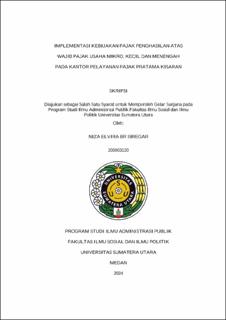| dc.description.abstract | The central government makes policies regarding taxation which are guidelines or principles used for tax imposition and collection. Regarding the income tax policy of Micro, Small and Medium Enterprises Taxpayers at the Kisaran Pratama Tax Service Office, they are still lacking in terms of knowledge and awareness of their tax obligations. This study was conducted with the aim of finding out and describing in detail the implementation of the income tax policy for Micro, Small and Medium Enterprises Taxpayers at the Kisaran Pratama Tax Service Office regarding the level of Taxpayer compliance and tax revenue from the MSME sector. The income tax policy for MSME Taxpayers in this study is Law Number 7 of 2021 concerning Harmonization of Tax Regulations.
This study uses a descriptive qualitative research method with data collection techniques, namely observation, interviews and documentation. The policy implementation model used in this study is the public policy implementation model according to Donald S. Van Meter and Carl E. Van Horn which influences implementation performance, namely: 1) Policy Standards and Targets, 2) Inter-Organizational Communication, 3) Social, Political and Economic Conditions.
The results of this study regarding the implementation of income tax policies for MSMEs at the Kisaran Pratama Tax Office have not been optimal, as evidenced by the decline in taxpayer compliance in 2023, although the number of taxpayers increased to 9,846, the compliance ratio decreased to 73.66%. This decline has an impact on MSME tax revenues at the Kisaran Pratama Tax Office, with negative growth of -4.16%. Although the objective of the policy is to ease taxpayers, limited socialization has led to low understanding, hindered compliance, and reduced revenue. After the pandemic, increased compliance in 2022 showed supportive conditions, but economic instability in 2023 affected taxpayer awareness, who tended to view taxes as a burden. Although the contribution of MSME taxes in 2023 was only around 1% because the majority had a turnover of under IDR 500 million, broader education, incentives, and communication efforts are needed to improve understanding and compliance. | en_US |


